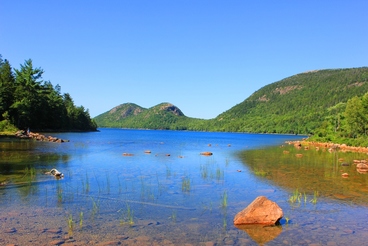
 This past August, Dr. Cohen, post-doc Abby Darrah, and M.S. student Melissa Althouse attended the 39th annual Waterbirds Society meeting, held on the beautiful campus of the College of the Atlantic in Bar Harbor, Maine. The meeting included special sessions on oystercatchers and cormorants, and included a new session on passerines, which lab member Alison Kocek helped initiate. Abby presented a poster on her current plover work: “Decision support population modeling for Atlantic Coast Piping Plover recovery: 2015 field season”. She also gave a talk on her previous postdoctoral work during the Aquatic Passerines symposium – “Effects of tamarisk (Tamarisk spp) biocontrol and removal on riparian breeding bird species of the Colorado Plateau”. Melissa drove up from her field sites on Cape Cod to give a talk on her master’s research: “Quantifying the effects of disturbance on staging Roseate Terns (Sterna dougalli) on the Cape Cod National Seashore” as part of a half-day symposium on avian behavior and conservation. Friday, a field trip day, was spent on a pelagic trip offered to participants by Bar Harbor Whale Watch. The boat cruised by several near-shore islands as well as Mt. Desert Rock, located 22 miles offshore. It was a fantastic trip, and highlights included numerous Wilson’s Storm-Petrels, Great Shearwaters, several species of skuas and jaegers, many Ocean Sunfish, and a porbeagle shark basking near the ocean surface next to the boat. The meeting wrapped up with a lobster banquet and the society’s traditional evening social and swim; Abby joined the many Waterbirds members brave enough to jump into the 55-degree waters of Frenchman Bay. In September, Abby and Research Associate Michelle Stantial attended the Western Hemisphere Shorebird Group meeting, as well as the pre-conference workshop on Piping Plover life cycle linkages. The meeting was held on the eastern shore of Virginia, at the Chincoteague Bay Field Station. To foster international collaboration, participants could give presentations in either English or Spanish, with translators in every room to provide translations in real-time which were broadcast into headsets available for participants. Michelle presented a poster based on her M.S. work titled “Automated telemetry for monitoring nocturnal behavior of breeding Piping Plovers on the Atlantic Coast”. Abby gave a presentation on her current work, titled “Decision support population modeling for Atlantic Coast Piping Plover recovery” in the Decision Analysis symposium. One morning plenary, given by Ted Simons on American Oystercatcher ecology, was held at Chincoteague National Wildlife Refuge, and there were early morning field trips to the refuge, which coincided well with fall songbird migration.
Congratulations to Michelle Stantial, who successfully defended her M.S. thesis on December 3rd, 2014, and received her degree. Michelle's thesis was entitled, "Flight Behavior of Breeding Piping Plovers: Implications for Risk of Collision with Wind Turbines," which was funded by the U.S. Fish and Wildlife Service and the Conserve Wildlife Foundation of New Jersey. The study was intended to address the potential impacts of coastal wind power development on an endangered species nesting along the Atlantic coast. Using flight data, the study predicted that the total number of piping plovers killed per breeding season (adjusted for 98 percent avoidance) could range among study sites from 0.01 to 0.29 for a small-scale residential turbine, 0.03 to 0.99 for a medium-sized turbine, and 0.06 to 2.27 with a large,utility-style turbine, and that collision risk was directly related to habitat configuration The risk assessment was aimed at providing wildlife managers a useful tool when making determinations throughout the permitting process as to whether or not piping plovers would be negatively impacted if turbines were to be built at or near nesting beaches.
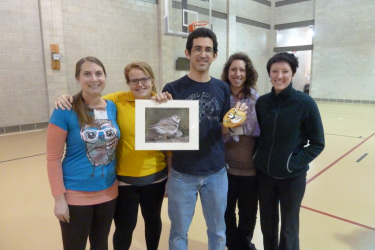 Dr. Cohen and grad students Michelle Stantial, Alison Kocek, Maureen Durkin, and Melissa Althouse attended the 2014 Atlantic Coast Piping Plover and Least Tern Workshop at National Conservation Training Center in Shepherdstown, WV this month. Dr. Cohen helped present the results of a structured decision making workshop for Piping Plover nest exclosures that he and Alison participated in this past December. Michelle presented initial results and conclusions from her study on Piping Plover flight behavior on the Atlantic Coast. Her work aims to identify whether proposed wind turbines placed within Piping Plover breeding areas will impact the birds during flight. As wind energy gains popularity, this issue is relevant for site managers across the breeding range, and her presentation was met with much interest. Maureen presented a poster on plover and tern road mortality in Florida. The whole lab group competed against eight other teams of piping plover scientists and managers in the 1st annual Piping Plover Olympics, which included trivia, a relay, logic puzzle, and band resighting events. After a tough competition, clinched by Dr. Cohen's rousing dramatic reenactment of a broken wing display, the ESF team took home the gold medal (shell). 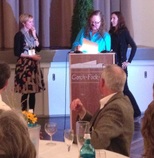 Michelle Stantial received an award for her oral presentation, "Flight behaviors of Piping Plovers Charadrius melodus: implications for risk of collision with turbines and other human structures" at the 37th Annual Meeting of the Waterbird Society in Wilhelmshaven, Germany. Maureen Durkin received honorable mention for presenting, "Waterbird road mortality at Gulf Islands National Seashore, Florida." 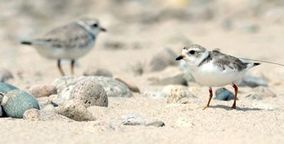 Source: Cape Cod Times/ Merrily Cassidy Source: Cape Cod Times/ Merrily Cassidy M.S. student Michelle Stantial's work examining the potential impact of wind turbines on Piping Plovers in Massachusetts received a write-up in the Cape Cod Times this summer. Nice work Michelle! Read the full article: http://www.capecodonline.com/apps/pbcs.dll/article?AID=/20130723/NEWS/307230323 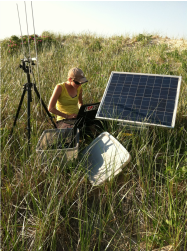 For her second field season studying piping plover movements and flight patterns in Massachusetts and New Jersey, M.S. student Michelle Stantial was able to build an automated telemetry system for monitoring radio-tagged plovers at her study sites. Michelle was awarded grants from the Goldenrod Foundation and the Garden Club of America to fund the telemetry station. She says of the system, "It helps us detect movements of piping plovers during times of poor weather and low-light conditions (times when birds are more susceptible to collisions with turbines). We leave it out on the beach and let it 'listen' to a bird with a telemetry unit for a few nights in a row, then we switch to another individual." Michelle's research will examine the implications of wind turbines piping plovers, specifically examining the potential for collision mortality if turbines are built in or near their habitat. |
Categories
All
Archives
July 2019
|
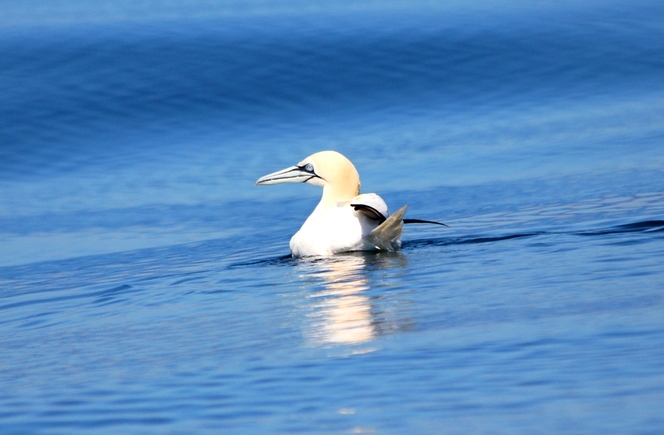
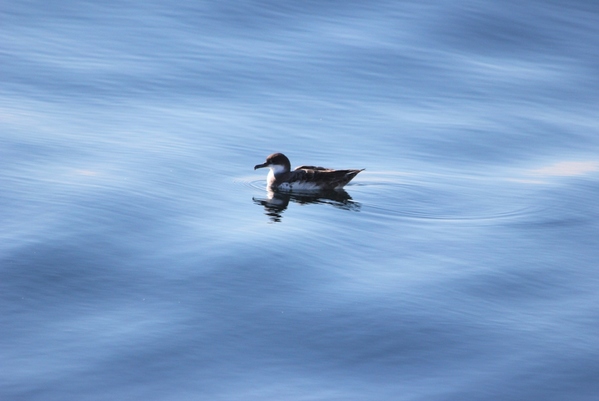
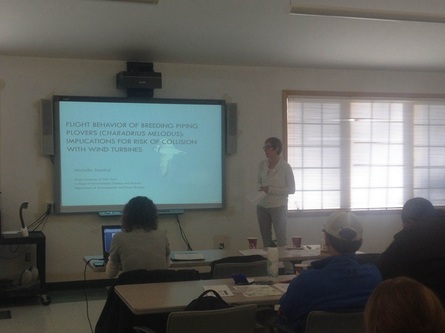
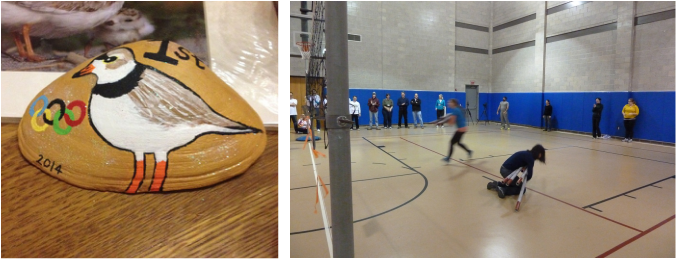
 RSS Feed
RSS Feed
